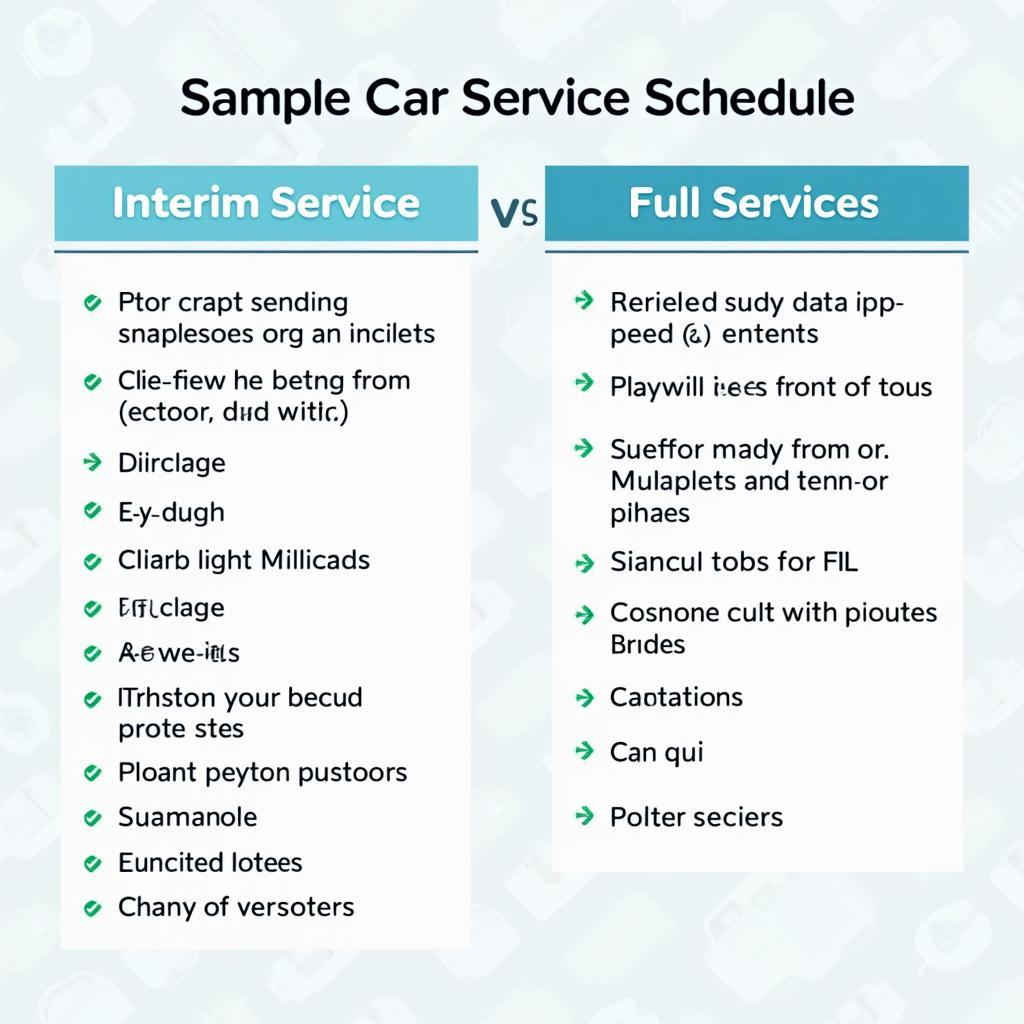Maintaining your car through regular servicing is crucial for its longevity, performance, and safety. But How Often Should A Car Be Serviced? This seemingly simple question doesn’t have a one-size-fits-all answer. Various factors influence the ideal service interval, from your vehicle’s make and model to your driving habits and the environment you drive in. This comprehensive guide will delve into these factors, helping you determine the optimal car service schedule for your specific needs.
Understanding your car’s service needs can save you money in the long run. Regular maintenance helps prevent minor issues from escalating into costly repairs. It also ensures your car runs efficiently, maximizing fuel economy and minimizing its environmental impact. Soon you will understand how crucial regular car servicing is, and know exactly how often your car should be serviced. Knowing when your car needs attention goes beyond just checking the oil; it involves understanding the various components that contribute to a smooth and safe driving experience. For more detailed information on car servicing frequency, you can visit how often should i get my car serviced.
Decoding Your Car’s Service Schedule
Every car comes with a manufacturer-recommended service schedule outlined in the owner’s manual. This schedule specifies the maintenance tasks required at different mileage or time intervals. These intervals are typically expressed in miles or kilometers, such as every 5,000 miles or 10,000 kilometers. They are also often expressed in time, such as every six months or one year. Adhering to this schedule is essential for maintaining your car’s warranty and ensuring its optimal performance.
Understanding the Difference Between Interim and Full Services
Interim services are typically recommended every 6 months or 6,000 miles and cover essential checks and replacements like oil changes, filter replacements, and brake inspections. Full services, recommended annually or every 12,000 miles, are more comprehensive and include more in-depth checks and replacements, such as spark plug replacements and coolant system flushes. You can find more information on recommended car servicing intervals at how often should you have a car serviced.
Factors Influencing Service Frequency
While the manufacturer’s schedule provides a baseline, several factors can influence how often you should service your car. Driving conditions, climate, and driving habits all play a role.
Driving Conditions and Climate
If you frequently drive in harsh conditions like stop-and-go traffic, extreme temperatures, or dusty environments, your car will require more frequent servicing. For example, frequent short trips can put more strain on the engine and require more frequent oil changes. Similarly, driving in extreme heat or cold can impact the effectiveness of fluids and lubricants, necessitating more frequent checks and replacements.
Driving Habits
Aggressive driving, such as rapid acceleration and hard braking, can also contribute to increased wear and tear, requiring more frequent servicing. Towing heavy loads or driving off-road can also necessitate more frequent maintenance.
The Importance of Regular Air Conditioning Service
Your car’s air conditioning system also requires regular servicing, especially in hot climates. This service typically involves checking the refrigerant levels, cleaning the system, and inspecting for leaks. For further information on car air conditioning service, you can refer to how often should car aircon be serviced.
Listening to Your Car: Recognizing Warning Signs
Beyond scheduled maintenance, it’s important to be attentive to any warning signs your car might be exhibiting. Unusual noises, vibrations, or warning lights on the dashboard could indicate a problem that requires immediate attention. Ignoring these signs can lead to more significant and expensive issues down the line. Regular maintenance can help identify these issues early, preventing them from escalating. For further details on car servicing frequency, please visit how often should i have my car serviced.
Common Warning Signs
- Unusual noises, such as squeaking, grinding, or knocking.
- Vibrations in the steering wheel, pedals, or seat.
- Warning lights on the dashboard, such as the check engine light or the oil pressure light.
- Fluid leaks under the car.
- Decreased fuel efficiency.
- Difficulty starting the engine.
“Regular maintenance is not just about keeping your car running; it’s about ensuring your safety on the road,” says John Smith, a certified automotive technician with over 20 years of experience. “A well-maintained car is a safe car.”
Conclusion
Regular car servicing is essential for maintaining its performance, longevity, and safety. While the manufacturer’s recommended schedule provides a good starting point, various factors, including driving conditions, driving habits, and climate, can influence the optimal service frequency for your car. By understanding these factors and being attentive to your car’s warning signs, you can ensure your vehicle stays in top condition and provides a safe and reliable driving experience. Remember, a well-maintained car is a safe and efficient car. More information on how often to service your car can be found at how often should car be serviced.
FAQ
- What is the difference between an interim service and a full service? An interim service is a less comprehensive service that typically includes an oil change and filter replacements. A full service is more comprehensive and includes more in-depth checks and replacements.
- How often should I change my car’s oil? This depends on your car’s make and model, driving habits, and the type of oil used. Consult your owner’s manual for the recommended oil change interval.
- What are some common warning signs that my car needs servicing? Unusual noises, vibrations, warning lights on the dashboard, fluid leaks, decreased fuel efficiency, and difficulty starting the engine can all indicate a need for servicing.
- How can I find a reputable car service center? Ask for recommendations from friends and family, check online reviews, and look for certifications and affiliations with reputable organizations.
- Is it important to follow the manufacturer’s recommended service schedule? Yes, following the manufacturer’s recommended service schedule is essential for maintaining your car’s warranty and ensuring its optimal performance.
- What happens if I don’t service my car regularly? Neglecting regular servicing can lead to more significant and expensive repairs down the line. It can also compromise your car’s safety and performance.
- Can I service my car myself? While some basic maintenance tasks can be performed at home, it’s generally recommended to have your car serviced by a qualified mechanic.
“Don’t wait until something goes wrong to service your car. Preventative maintenance is always the best approach,” advises Jane Doe, another experienced automotive technician.
Need further assistance? Check out our other helpful articles on car maintenance and repair on our website. Have questions about specific car models or need personalized advice? Contact our 24/7 support team via WhatsApp: +1(641)206-8880, or Email: [email protected]. We’re here to help!


